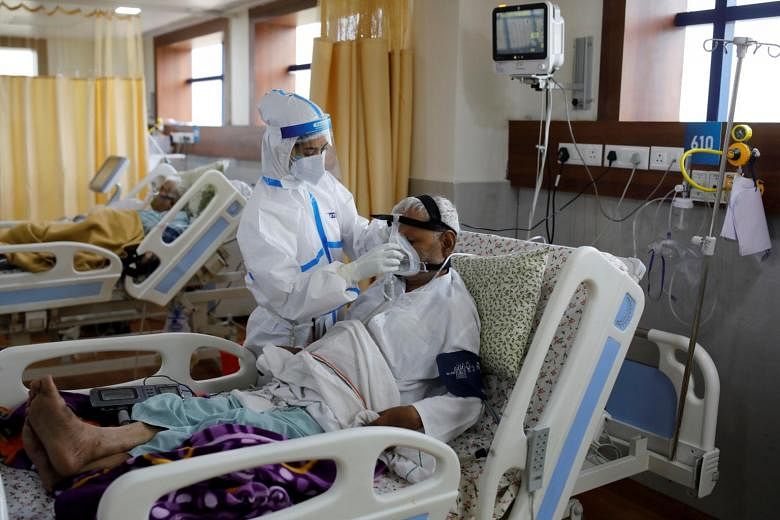NEW DELHI - Coronavirus cases have been on a downturn trend in India, but the capital city of Delhi has bucked the trend as it witnesses a third wave of the pandemic.
The city on Wednesday (Nov 11) recorded a new high of 8,593 new Covid-19 cases, up from around 2000 cases a day in September.
The Delhi High Court warned the capital city could become the Covid capital of the country even as reports are emerging of fast filling hospital beds.
The court on Thursday allowed the government to reserve 80 per cent of the intensive care unit beds of 33 private hospitals for Covid patients, even as half of the city's 16,588 beds reserved for Covid patients are now occupied. Of 1,288 ICU beds with ventilators, 1,119 are occupied.
India, which had a stringent lockdown, remains the second most affected country after the US by the pandemic. Still, the overall number of Covid cases have fallen. On Wednesday, 47,905 new cases were recorded, compared to over 80,000 a day in early September. The national recovery rate is 92.98 per cent, according to government data.
The reduction in the coronavirus number is seen to be coming from states like Maharashtra.
But Delhi, which has a population of over 19.8 million people, has struggled to control the coronavirus pandemic. It has a total of over 459,000 cases and a death toll of 7,228.
"Delhi has historically been destroyed and rebuilt seven times since ancient times. It also seems destined to be invaded by Covid 19 many times. It is now going through the third cycle of rise and fall in the case counts since February 2019. Every time the restraints are relaxed, there is a tendency to crowd in the markets," said Professor K. Srinath Reddy, president of the Public Health Foundation of India.
"The festive season in October to November coincides with the advent of winter and rise in air pollution levels. Together with the superspreader events fuelled by shopping sprees for festival discounts, these factors give the virus a huge scope for spread."
The city's coronavirus troubles have intensified due to the annual spike in pollution every winter, brought on by stubble burning to clear farmland in neighbouring states. This, exacerbating vehicular and industrial pollution, taking the Air Quality Index into the very poor and unhealthy category.
The Indian Medical Association has warned that one in eight Covid-19 cases could be linked to pollution, which studies have shown increases risk of infection and suffering serious illness and death.
"Increased air pollution leads to increased inflammatory response; 13 per cent of the increase (in Covid cases) has been estimated to be due to pollution," the IMA said.
A study published in the journal Cardiovascular Research said long-term exposure to air pollution could be linked to 15 percent of Covid-19 deaths globally.
A study out of Harvard recently found that someone living in an area of high-particulate pollution is actually 8 per cent more likely to die from Covid than others with less pollution.
Across Delhi, crowds have been noted in markets during the festival season and the lead up to Deepavali, the festival of lights.
Dr Sandeep Sharma, a doctor in South Delhi, said that people were no longer scared of Covid.
"I feel that probably the fear factor is gone. Now people are taking it lightly. They know corona is there to stay and they have to live with it. The restrictions are gone, so people are meeting and partying," said Dr Sharma.
"And that is the reason, we are getting more and more patients. They are not realising effects can continue post Covid."
Health experts warn of a festive surge in other parts of north India too.
"Overall, India has been maintaining a steady decline in rates of Covid-19 cases and deaths since September. However, North India faces the danger ahead of a severe winter, high air pollution and long festive seasons which spurs crowded celebrations and frenzied shopping in urban areas," said Prof Reddy.
"The danger of a fresh virus surge has to be contained through strong public health measures which call for resolute regulatory measures and individual measures for personal protection. The virus must not be permitted to dominate our lives when the calendar changes to 2021."












